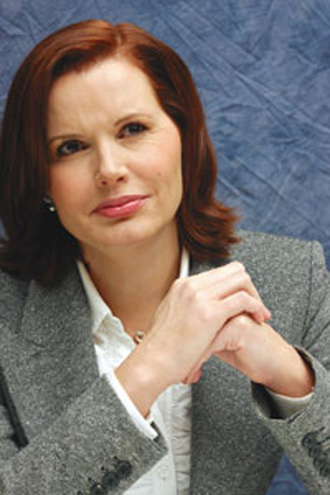 Madame President?
Madame President?
Q: Q uestion for political science professor Pamela Jensen: There's an increasing amount of buzz in the press that Hillary Clinton or Condoleezza Rice may run for president. Some political pundits even suggest that the television show Commander in Chief, in which Geena Davis plays the president, is laying the groundwork for Americans to vote for a woman. Is America ready to elect a female president?
A: I'm surprised that people are still asking this question. In my mind, the issue is already settled. Without question, I think America is ready to elect a woman to the presidency.
I like Geena Davis. I'd definitely vote for her! I think that mainstream television follows public opinion rather than making it. Film and television push the envelope in regard to shock value, of course, but if popular culture is too far ahead of society, we won't watch. I think Commander in Chief is a reflection of where we're already headed.
The fact that Geraldine Ferraro ran for vice president in the early 1980s is significant. That was a turning point. It was a signal moment in history. Someone had to be the first woman to run on a major party ticket. We mark those kinds of moments because they seem to represent progress toward a more democratic and egalitarian society. Because that helped to break down barriers, I think we're now ready to look at the merits and qualifications of a woman who runs for president and not get hung up on gender.
Both Hillary Clinton and Condoleezza Rice are very credible candidates for the presidency. I don't see that Condoleezza Rice has the disposition toward electoral politics, and she says she's not going to run. Meanwhile, I have the impression that very few people doubt Senator Clinton is running. Her candidacy is extremely credible. I know that people have strong feelings about her one way or another. And I think the Democratic party itself has some question as to whether she would be too polarizing.
Given that it's 2006 and we haven't had a woman in the White House, it's probably worth asking what kinds of things have been standing in the way. It might be easier in a parliamentary system for a women to rise through the ranks, and this probably accounts some for what seems like such a lengthy delay in electing a woman. A parliamentary system allows you to work with party officials, and once you've demonstrated your merit and your party is elected, you can become prime minister. That's a much different process than having to go through the entire electoral cycle.
I think we may be seeing a lack of women rising to power because we've entered the post-feminist era. Many of the current generation of women I'm teaching at Kenyon are very comfortable saying that they want to stay home and raise children or put their careers on hold. It's true for some men as well. I hear many young men and women saying that what they want from life is a family. So I think it's fair to say that one reason we don't see more women in positions of leadership is that they voluntarily devote their lives to other pursuits. All Americans tend in fact toward private rather than public life, and it takes a special person--male or female--to endure the poundings and difficulties of seeking elective office.
Can a woman be an exemplar of democratic greatness? Yes. Absolutely. I hope to see a woman elected to the presidency in my lifetime, and not just to see us pass some kind of barrier, but because it would confirm my faith in what America can be. To see the kinds of qualities I'd like to see in a president, we could start with Rosa Parks, and add a pinch or two each of Coraz Ó n Aquino and Margaret Thatcher.
Professor of Political Science Pamela Jensen is an expert in political philosophy with a special interest in politics and literature. "Women and Politics" is one of the many courses she has taught during her twenty-seven-year tenure at Kenyon.
Do you have feedback on this page?
